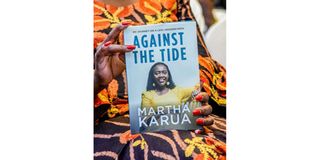
Narc Kenya party leader Martha Karua's book “Against the Tide’’ pictured on November 17, 2024 at Serena Hotel in Nairobi.
There has been a deluge of memoirs in Kenya recently. Everyone in the country seems eager to tell their story. Undoubtedly there is an anecdote, a piece of information, a saying, something that would be of interest to different readers.
Historians find these memoirs worthwhile because they sometimes reveal elements of history - often personal - that may not be easy to find in the archives. For instance, the personal life of an individual may be hidden from the public till the person herself writes about it.
Recent memoirs by Kenyan professionals have revealed the difficulties of life under colonialism, highlighting the specifics of racism and class differences under colonial rule, the atrocities of state, the struggle to depose the colonial regime, the joys of independence, the collapse of the dream of an inclusive Kenya, the rise and fall of the Kanu regime’s dictatorship, the post-2000 Kenya and its successes and failures etc.

Former Lands Permanent Secretary Dorothy Angote, Regional Director for the Friedrich Naumann Foundation for Freedom in Sub-Saharan Africa Inge Herbert, Narc Kenya party leader Martha Karua, Retired Chief Justice Willy Mutunga and Retired teacher John Gomes during Ms. Karua’s “Against the tide’’ book launch event held on November 17, 2024 at Serena Hotel in Nairobi.
Martha Karua’s memoir, “Against the Tide: My Journey on a Less Trodden Path” (Publishing Institute of Africa: 2024) adds to the fair collection of auto/biographies published this year in Kenya by public figures. But there are a number of good reasons why Martha’s book is worth reading compared to those of her peers in the legal profession, civil society and politics. One would say that so far so good, Against the Tide is the best memoir from a Kenyan politician in the past few years. Why?
Writing memoirs is not an easy task. It is about choosing what to include and what to exclude. It is about trying to ensure that when one writes, they are telling the reader what he or she already knows and some more that they do not know. Yet, it is not easy to satisfy the expectations of the reader since the author does not necessarily know what they are. As for the readers, they are probably more than the number of copies of the memoirs that will be sold. Each one of them might have their own expectations? For instance, what were readers expecting from Martha’s book? What would she tell the reader that was not already known by the public, or should one say, those who have followed her career and life?
Well, Against the Tide tells a lot about Martha. But foremost is the confirmation of her character as an indomitable spirit. Martha is not your usual Kenyan politician who thrives on wishy-washy political principles. No. Martha has been known for a long time in Kenyan politics as the ‘Iron Lady.’ The comparison with the former Prime Minister of Britain, Margaret Thatcher, has its reasons. Martha has been tested and found sturdy and steady in Kenyan politics over time. She has always chosen her path, unswayed by the prescriptions of the men who dominate the offices of Kenya’s political parties.
Very few Kenyans today would remember that Martha was a founder member of the then formidable Forum for the Restoration of Democracy (Ford) in the early 1990s. Still, fewer Kenyans would recall that Martha was elected to Parliament on a Democratic Party ticket when the big boys in Ford-Asili tried to shortchange her. Martha had joined Ford-Asili, which was led by Kenneth Matiba when Ford split into two, with the other wing Ford-Kenya being led by Oginga Odinga.
But how or why did a young lawyer who had just resigned from the Judiciary join politics? Martha says that the wind of change that was blowing in Kenya in the 1990s, with politicians and civil society activists challenging the Kanu hegemony, she felt that it was the right time to try her hand at politics. She would be encouraged by her parents and siblings when she announced that she was running for the Gichugu parliamentary seat. Martha was jumping into shark-infested waters. She hardly knew how rough Kenyan politics were.
Martha’s biggest challenger was a household name in Kenya, not just in Gichugu. Geoffrey Kariithi was a man who had worked for presidents Jomo Kenyatta and Daniel Moi as the Head of Public Service. He had been elected Gichugu MP in 1988 and appointed an assistant minister for Tourism, but had resigned from the ruling party and joined the newly-formed Ford in 1991. How did Martha expect to beat such a formidable opponent?
Martha did beat Kariithi and two other competitors in the general elections of 1992 as the first female MP for Gichugu. She “would be for four consecutive terms, a record I still hold at the time of writing this book,” writes Martha. In 1992, Martha was among the only six women who were elected to Parliament on different party tickets, which was a record. These women MPs would also go on to break the glass ceiling when Nyiva Mwendwa, who had been elected on a Kanu ticket, became the first-ever woman Cabinet minister in Kenya’s history — as the Minister for Culture and Social Services.
Martha’s political story is the easier one to access and appreciate. But what about the fact that at just about 24 years of age, Martha would be appointed a magistrate in Nakuru, where she would unsettle the old order in the Judiciary which used to take instructions from members of the Executive when she refused to jail petty offenders such as sellers of local brew. From Nakuru, Martha returned to Nairobi and served at the Nairobi Law Courts as well as Makadara Law Courts, then Kibera Law Courts as Acting Senior Resident Magistrate.
She decided not to renew her contract thus abandoning her “original plan of building a career as a judicial officer, opting to pursue private practice as an advocate.” It is her work as an advocate that led her into activism as she had to represent in court Kenyans who had run afoul of the system such as Mirugi Kariuki and Koigi wa Wamwere.
Whilst a magistrate, Martha got married and started a family. But as she writes, “the life of wedded bliss I had conjured up in my mind began to develop cracks” not so long after. She would end up moving out of her house by her daughter’s first birthday. Unlike many Kenyan politicians or public figures, Martha is not shy to speak about the breakdown of her marriage; having to raise her two children on her own, but keeping their father’s name; suffering innuendo in politics because of her marriage; later having to drop her former husband’s name and keeping her father’s, among other elements of her identity.
But how did Martha become such an unshakeable woman who challenged teachers all the way from primary school? Martha had grown up in a loving family, with a very supportive mother and father. Her father would always stand by her, taking her side when he believed that her teachers were being unnecessarily overbearing. Thus, this is an individual who grew up with a deep sense of her rights and justice, which explains why she made up her mind that she would want to become a judge when she once accompanied her father to the courts.
One senses that Martha still has a longer story to write. There are gripping narrations of the political intrigues — the Narc days; PNU days; the 2007 elections; resigning from the Cabinet; Azimio etc — that she has been involved in in Against the Tide, but there has to be more in store that she should write one day. This is a book really worth having on the December reading list.
The writer teaches literature, performing arts and media at the University of Nairobi.












